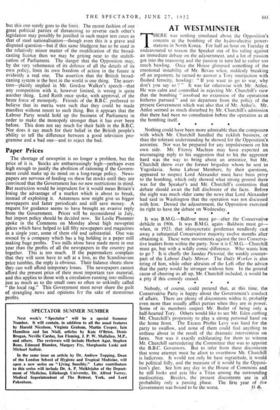Paper Prices
The shortage of newsprint is no longer a problem, but the price of it is. Stocks are embarrassingly high—perhaps even high enough to justify the abolition of rationing if the Govern- ment could make up its mind on a long-range policy. News- papers are nervous of feeding on these fat stocks until they are convinced that the Government has no new restrictions in mind. But restriction would be imprudent for it would mean Britain's losing the advantage of a market which is about to break, instead of exploiting it. Astuteness now might give us bigger newspapers and fatter periodicals and still save money. A request for guidance seems to have brought an evasive reply from the Government. Prices will be reconsidered in July, but import policy should be decided now. Sir Leslie Plummer spoke in the Commons on Monday about high newsprint prices which have helped to kill fifty newspapers and magazines in a single year, some of them old and substantial. One was owned by a company which has a big holding in a paper mill making huge profits. Two mills alone have made more in one year than the profits of all the newspapers in the country put together. This is too much. If the papermakers complain that they will soon have to sell at a loss, as the Scandinavian price tumbles, the reply is obvious. Their balance sheets show they can well afford temporary losses. The newspapers cannot afford the present price of their most important raw material, and this applies to those with a circulation running into millions just as much as to the small ones so often so unkindly called " the local rag." This Government must never share the guilt of strangling news and opinions fcr the sake of monstrous profits.


































 Previous page
Previous page